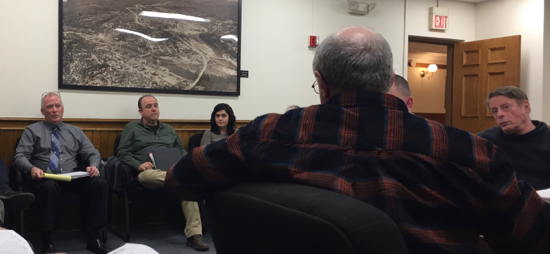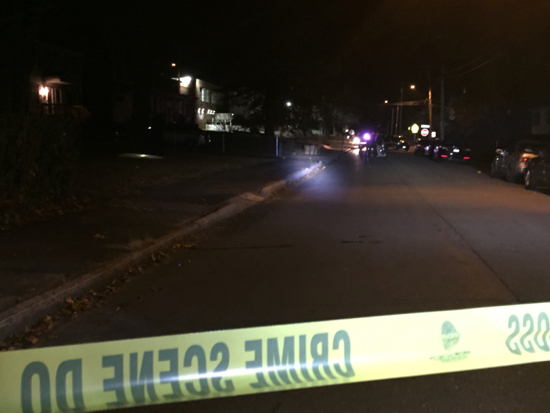photo:ethan fry Ansonia Police Chief Kevin Hale (left) listens to Alderman Charles Stowe during a meeting March 9, 2017.
During that time there have been three shootings on the city’s streets.
The chief said that’s not a coincidence.
“There were three street shootings I believe are a direct correlation to that unit not operating at its maximum, or at what should be its minimum,” Hale said.
The chief’s comments came at a budget workshop of the Aldermen’s finance subcommittee March 9.
The Aldermen are trying to create a budget for the next fiscal year. They’re crunching numbers to come up with a way to deliver adequate funding to city departments while not raising property taxes. The finance subcommittee has been meeting with city officials to try to find where they can save money.
Next year’s budget is shaping up to be especially tough because of uncertainty over how much money in state aid the city will receive.
The city’s grand list won’t provide enough additional revenue needed to make up for any cut in state aid. Meanwhile, the city is still tapping its fund balance as a way to stabilize the mill rate, a technique that cannot last forever.
Police Budget
Last month Mayor David Cassetti presented a “worst case scenario” budget proposing drastic cuts to departments such as the library and recreation.
The mayor’s budget envisioned police department spending for 2017 – 2018 at $6,167,290.
That would be a $33,382, or 0.54 percent, increase over their budget for this year — but $73,268 short of the department’s original request.
The police department is currently six officers short of its full complement, Hale said. Two officers are currently in the police academy. Several candidates are in the midst of the application process.
One idea for savings, floated by First Ward Alderman Charles Stowe — hold off on filling two of the vacancies.
Stowe said he was voted onto the Board of Aldermen by people who “would like to see this city making revenue with businesses, restaurants, whatever it may be. And I know from the town I grew up in, Oxford, if your mill rate goes beyond a certain point, it ties your hands.”
Stowe asked how much money could be saved in the police budget “if we were able to delay for a year or two with two officers less than what you’re hoping for.”
Hale replied that he has to look “beyond the budget.”
“I understand the mill rate has an impact,” the chief said. “But so does your crime rate.”
Anti-Crime Unit
Hale then brought up the anti-crime unit, which was launched in 2009 to focus on special investigations.
The unit has played a pivotal role in a number of big arrests, including the June 2012 takedown of a drug dealing crew during which cops raided 11 homes in five different towns.
Hale said he used to regularly call Aldermen to update them on work the unit was doing in their neighborhoods.
“I haven’t made those calls in quite some time because we’re down to one (officer),” Hale said. “To minimally run that unit, I need three officers. We have one right now.”
Stowe asked how long the unit had been short-staffed. Since mid-August, Hale said.
The chief said he had to hold off on assigning new officers to the unit because of other priorities.
“Our ultimate mission is uniformed officers on the street responding to calls,” he said. “But detectives do a great job. This crime unit has done a phenomenal job. But I didn’t backfill it because it would have strained patrol even more.”
Hale said that has led to a rise in street violence, alluding to the three recent shootings.
He referred to an update he gave Aldermen during their meeting last month, when he discussed the recent spate of shootings and said, “These aren’t just random incidents. These are known people to us.”
“We know who these individuals are,” Hale said last week. “They were targets of that crime unit. That’s about as much as I can tell you, but that’s a fact.”
FILE Police cordoned off a section of Howard Avenue while investigating a shooting Nov. 28.
“Well I think I’ve showed that I’m a proponent to public safety,” Stowe said. “However, let’s look at this like it’s a scenario that probably won’t happen. If we took two policemen, just said ‘We’re not hiring two,’ what would that do with our budget?”
It would save about $125,000 in salaries, Hale said, plus the cost of the officers’ benefits.
Phil Tripp, the president of the Board of Aldermen, who attended Thursday’s subcommittee meeting, noted that the city is in a tight spot budget-wise.
“We’re just looking for a little bit of savings from each department. It’s not that I’m anti-police,” Tripp told Hale. “The whole city’s hurting right now.”
“I get it. I’ve been around long enough,” Hale said. “I don’t want to see the city in trouble that way, but I’m trying to balance that with my desire to not see us lose the gains we’ve made on our end. We’ve already seen that, and we don’t want that to get worse.”
Stowe suggested police see if they could save money in other areas that could free up more money to pay cops.
The chief pointed out the bulk of the department’s budget is in salaries — as is the case with most departments.
He also noted that the process of hiring and training police officers takes about 12 to 15 months.
“If I could give you $100,000 in non-salary savings, this would be easy,” the chief said. “Copier toner doesn’t add up to that.”
The chief asked Aldermen to give him a “target number” to shoot for in terms of savings. The Aldermen later settled on $150,000.
Not all of them seemed as keen to ask police to hold off on making hires.
First Ward Alderman Randolph Carroll said he disagreed with Stowe. A Fourth Street resident, Carroll noted that some of the recent gunplay occurred in his neighborhood.
“I am not for cutting back on police officers,” he said. “There are other places in this budget that we can slash drastically that we can fund the chief for the services that his department gives this city.”
Stowe said that he didn’t want to make cuts, but was just having an “open-minded discussion.”
Martin Dempsey Jr., a Fourth Ward Alderman, said that if the department can identify a good candidate, he’d hate to see them not make the hire because of budget uncertainty.
Two members of the Board of Police Commissioners, Paul Heon and Michael Rinaldi, also attended the meeting.
Rinaldi told Aldermen by having fewer officers “you’re also jeopardizing officer safety for the members of the department that are presently on there.”
“If you’re running shorter shifts, response times are expanded, backup takes longer to get there,” he said. “It’s something that also has to be considered.”